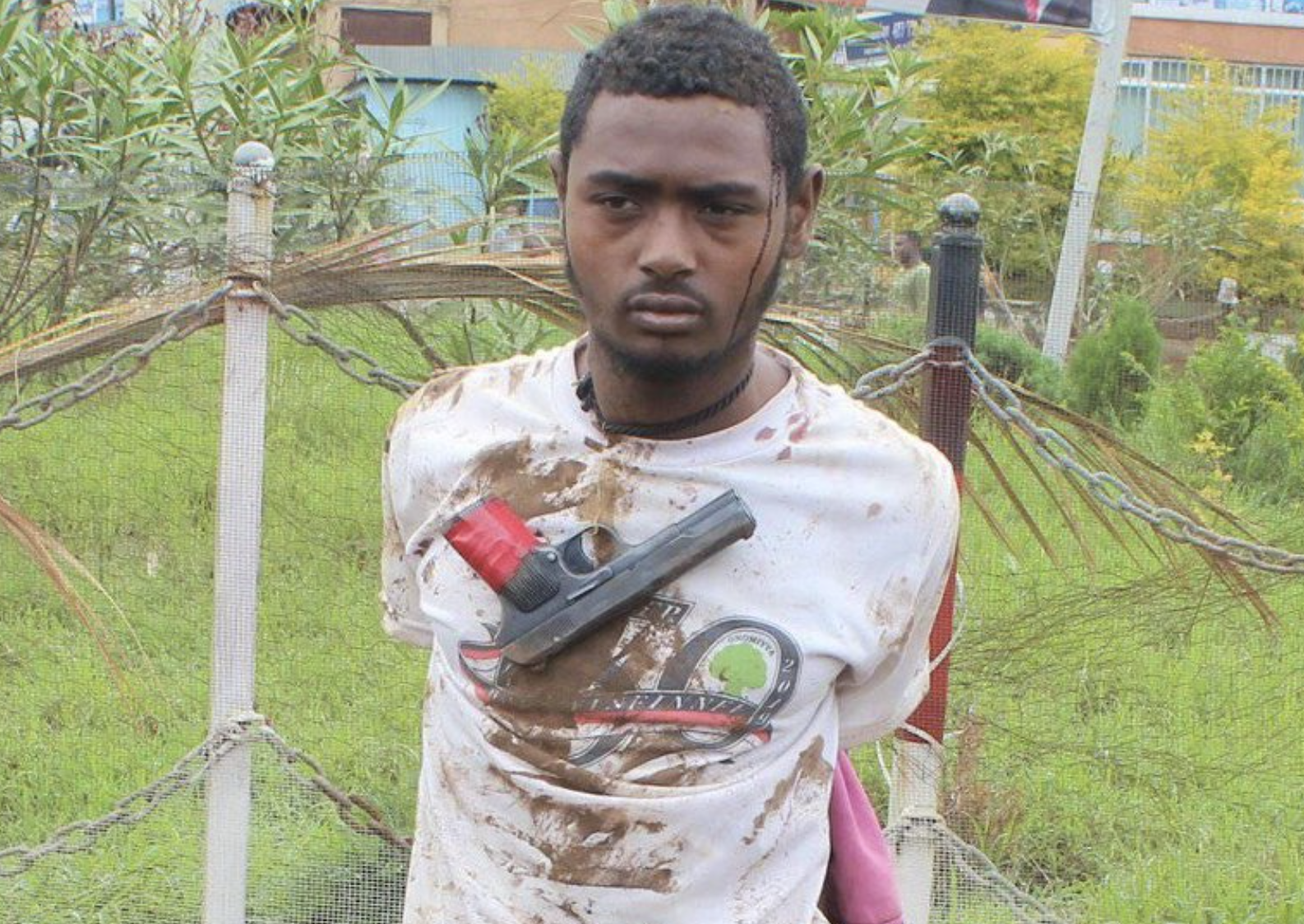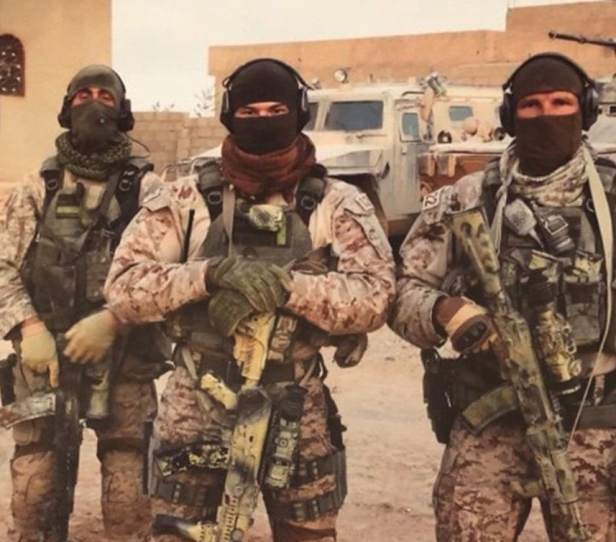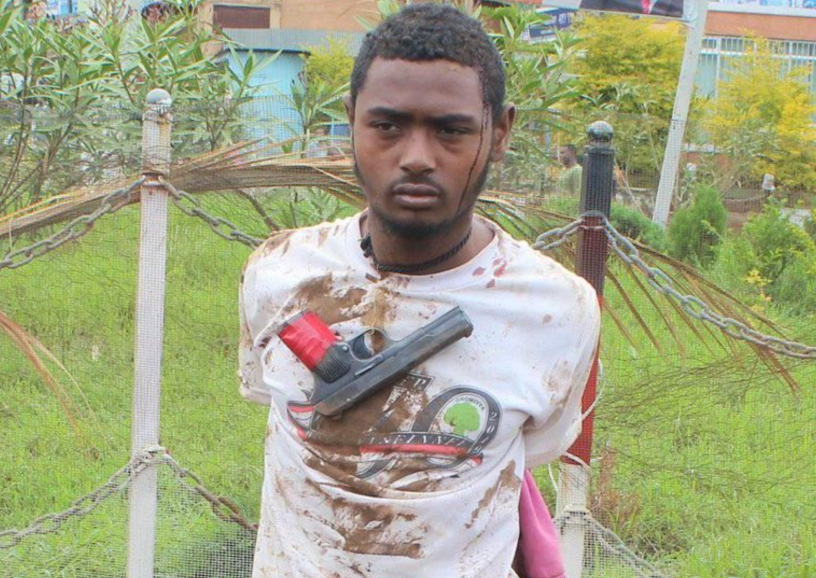The extent and nature of human rights violations by security forces in Ethiopia is appalling. The Ethiopian government must assertively defend the democratic order from regression, counter the authoritarian behavior of the police and security agencies, and take drastic measures to ensure accountability for human rights violations.
Source: Ethiopia Insight
5 April, 2022
by Alemayehu B. Hordofa

Independent oversight and legal reforms are needed to address extrajudicial killings.
The EPRDF government that ruled Ethiopia from 1991 to 2019 was infamous for using the country’s legal system and institutions for its political interests.
For instance, in response to the Oromo protest movement that began in 2014, Ethiopia’s police and security agencies employed unconstitutional investigation techniques and brutalized protesters to suppress dissent, including by using lethal force.
In 2020, the Ethiopian government publicly acknowledged the veracity of such accusations, including those made in the UN’s 2010 Committee against Torture report. Prior to this, Prime Minister Abiy Ahmed’s parliamentary briefing in 2018 noted that government security forces had committed atrocities on prisoners, while police and prison authorities were complicit in torture committed in secret detention facilities.
After coming to power in 2018, Abiy undertook sweeping political and economic liberalization measures. The government initiated a series of legal and administrative reforms based on a promise to change the authoritarian tendencies of government institutions.
To this end, the government amended the draconian civil society statute, made significant amendments to the repressive anti-terrorism proclamation, amended the federal prison proclamation to bring its standards in compliance with international protocols, continued to release political prisoners, publicly apologized for gross human rights violations, and conducted ‘selected prosecution’ for human rights abuse and corruption crimes.
The government also took the audacious step to reform its security and military apparatus, even though doing so provoked opposition from some senior personnel of the affected institutions. In time, law-enforcement authorities were among those that exhibited promise by implementing reforms.
EXTRAJUDICIAL KILLINGS
Despite the promises and achievements, the democratic reform process is currently encountering challenges with regard to the rule of law due to recurring illegal actions of security forces across the country.
The most recent example of such abuses came after a footage went viral on social media showing a gruesome instance of security forces burning an individual alive. The video was reportedly shot in the Metekel Zone of the Benishangul-Gumuz region. In the video, we also see the burned bodies of other victims.
On 13 March, the Ethiopian Human Rights Commission (EHRC) released its findings on this incident. In its media briefing, the national human rights body called for the Ethiopian government to ensure accountability for this heinous crime and promise redress for the victims’ families.

Extrajudicial killings by Ethiopia’s security forces: rule or exception?
by Ermias Tasfaye
The horrific immolation in Benishangul-Gumuz was not the first time that the Ethiopian public witnessed brutal killings at the hands of federal and regional security forces.
Recently, the Oromia regional security forces ruthlessly killed the religious and customary leaders of Kereyu Geda Michile, one of the Oromo clans widely known as “Guardians of Oromo cultural heritage” for their unique role in preserving Oromo’s traditional and cultural values such as the Gadaa system.
According to witness testimonies received by the EHRC, the security forces perpetrated this ruthless act based on the belief that these community leaders provided moral support for insurgents operating in the area.

Amid blackout, western Oromia plunges deeper into chaos and confusion
by Ermias Tasfaye
In May 2021, Oromia security forces summarily executed Amanuel Wendimu in the town of Dembi Dollo after parading him in public and forcing him to make self-incriminating statements.
The Dembi Dollo Communication Office justified this cruel act of summary execution by citing the victim’s alleged participation in Abba Torbe, a clandestine assassin group in Oromia.
Similarly, credible media reports condemned Ethiopian security forces for taking prisoners out of their cells, particularly in Oromia, and executing them. There have also been times when security forces passively condoned gross human rights violations perpetrated through mob ‘justice’, thereby participating in the crime through omission.
INDEPENDENT OVERSIGHT
These and other horrendous violations demonstrate the entrenched nature of the security forces’ human rights abuses and indicate that their repressive attitude has not withered away.
The investigations into these and other similar allegations of violence by security forces remain largely obscure. For example, the federal and regional police commissions have failed to publicize data concerning the number of complaints they have received from individuals alleging police acts of human rights abuse, the number of perpetrators that were held accountable, and cases that were rejected without further consideration.
Ethiopia has an international obligation to conduct an effective investigation into human rights abuses committed by its security forces. International jurisprudence requires that an investigation into complaints of police violence must be conducted impartially by ensuring the personal, structural, and institutional independence of the investigating entity.

Accountability for atrocities—why Ethiopia should join the ICC
by Kassahun Molla Yilma
To be effective, this type of investigation should be promptly and thoroughly conducted by experts who are not implicated in the commission of the offense, and with full guarantees of participation by victims and their families in the investigation process.
To properly investigate such crimes, there is a need to establish an independent domestic body with nationwide jurisdiction. Such an institution is needed because there is a high probability of bias when police are tasked with investigating the crimes of fellow officers. The possibility for officers’ to shield or protect their fellows from accountability through refusal to investigate or suboptimal investigation is high.
Moreover, victims alleging police violence overwhelmingly refrain from filing a complaint to the same institution and police stations where they had previously been subjected to human rights abuses, due to fear of retribution and being victimized a second time.

Our ‘protectors’ in blue: Police brutality and misconduct in Ethiopia
by Ayele Woubshet
Furthermore, the thematic questions to be addressed by the investigating body would need to go beyond the individual responsibility of the offending police officers. Because the abuses committed by security officers are allegedly so pervasive, there would also need to be an investigation concerning broader institutional responsibility.
Thus, at least as a matter of public perception, assigning an investigatory mandate to the same institution implicated in committing the offense—and that as a result has a stake in the outcome of the case—would compromise the independence of the investigation.
LEGAL GAP
The legal gap is another factor contributing to the security forces’ horrendous brutalities.
Ethiopia lacks consolidated and comprehensive laws that regulate police use of force. The limited provisions on the matter scattered in the 2004 Criminal Code and other criminal statutes remain inadequate and below international standards.
Independent voices have criticized security personnel for using unnecessary and excessive force. Such criticism has increased due to the security personnel’s use of unchecked violence in some regions, arguably to control crime in areas where insurgents are fighting with government forces.

Judicial reform in Ethiopia: Inching towards justice
by Leul Estifanos
In these areas, the Ethiopian public has witnessed patterns of summary executions, extrajudicial killings, and police defiance of court orders.
The Ethiopian government promised that it would finalize the drafting process of the consolidated law on the use of force in 2019. However, the country has thus far failed to deliver on its promises.
Furthermore, the current Criminal Procedure Code lacks special rules that guarantee the effectiveness of investigations into alleged human rights crimes committed by security forces.
WE NEED YOUR SUPPORT TO ANALYZE NEWS FROM ACROSS ETHIOPIA
PLEASE HELP FUND ETHIOPIA INSIGHT’S COVERAGE
The substantive criminal law has dedicated some sections to crimes that police and members of the Ethiopian National Defense Forces (ENDF) might commit. However, the investigation of crimes committed by people in uniform is governed by the same Criminal Procedure Code that regulates the investigation of other crimes, and this code does not contain rules that ensure the practical independence of investigators.
There is no separate institution authorized to conduct an investigation when police brutality and ill-treatment are alleged. Due to this institutional gap, the same police institutions and officers or their associates are entrusted to investigate crimes committed by the police or security officials.
PRACTICAL CHALLENGES
According to Article 6 (3) of the Attorney General Establishment Proclamation, the Federal Attorney General’s Office (now the Ministry of Justice) is tasked to lead the criminal investigation process.
Article 2 (c) of the recently adopted Definition of Powers and Duties of the Executive Organs Proclamation 1263/2021 empowers the Ministry of Justice to “oversee, follow up and coordinate the criminal investigation function of the Federal Police investigation division and require that a report be submitted to it.”

The Ethiopian Human Rights Roadmap: a feeble bulwark against atrocity crimes
by Yohannes Eneyew Ayalew
However, the role of public prosecutors to ensure the independence of the investigation process has been marred and effectively negated by practical challenges.
The police force has been given an extensive role in investigating human rights crimes committed by its members. There have been various credible reports concerning police rejecting instructions from the prosecution office without accountability and police rebuffing court orders.
The investigation wing of the police institution is accountable to their respective federal, regional, or city administrations’ police commissions. Neither the Ministry of Justice nor Regional State Justice Bureaus have a mandate to hire, fire, or take administrative action against police investigators.
FOLLOW ETHIOPIA INSIGHT
Even when taking criminal action against offending investigators, prosecutors have to rely on the police to investigate.
The Attorney General Establishment Proclamation authorizes public prosecutors to lead criminal investigations, but the prosecution office lacks a clear legal mandate to conduct a solo investigation. The role of public prosecutors in criminal investigation is merely supervision in practice and hence insufficient to guarantee the independence of investigations into human rights abuses.
INQUIRY COMMISSIONS
Ethiopia has experience with establishing independent commissions of inquiry to investigate crimes committed by police, security personnel, and military forces—even though the de facto independence of such commissions was questionable.
Ethiopia established an ‘independent’ inquiry commission after the conflict in Gambella, and another inquiry commission to investigate political disorder in Addis Abeba following the contested May 2005 elections that descended into street violence.

An Independent Inquiry Commission can ease Ethiopian impunity
by Brook Kebede
Recently, Ethiopia established an Inter-Ministerial Taskforce to investigate crimes and human rights violations committed during the conflict in Tigray that later expanded to the neighboring Afar and Amhara regions.
The two inquiry commissions were established by proclamations and their role was only to conduct a fact-finding exercise; they didn’t have the authority to prosecute alleged offenders.
STRUCTURAL DEFICITS
The extent and nature of human rights violations by security forces in Ethiopia is appalling.
The Ethiopian government must assertively defend the democratic order from regression, counter the authoritarian behavior of the police and security agencies, and take drastic measures to ensure accountability for human rights violations.

Reducing impunity in Ethiopia via the United Nations
by Yigedebal Abay
One such measure would be adopting a comprehensive law to address the absence of a legal framework regulating police use of force and adopting procedural rules that warrant full independence for the investigation of police crimes.
Addressing the structural defects and institutional gaps in relation to criminal investigations into alleged police or security forces’ human rights crimes is another measure that the government should take to eliminate the conditions that are serving as the breeding ground for impunity.
If the Ethiopian government is sincere in its public declaration to end impunity, it is high time for it to defend the democratic transition from regression. It should do so by establishing a genuinely independent body, with perpetual existence, with a mandate to conduct thorough investigations into human rights crimes committed by its agents.
Disclaimer: Although the author is a prosecutor at the Ministry of Justice, he wrote this article in his personal capacity by using publicly available information. Opinions expressed here are his and not of the Ministry.













 In several towns in Western Tigray, signs were displayed demanding that Tigrayans leave, and pamphlets distributed issuing Tigrayans a 24-hour or 72-hour ultimatum to leave or be killed. © 2022 John Holmes for Human Rights Watch and Amnesty International
In several towns in Western Tigray, signs were displayed demanding that Tigrayans leave, and pamphlets distributed issuing Tigrayans a 24-hour or 72-hour ultimatum to leave or be killed. © 2022 John Holmes for Human Rights Watch and Amnesty International Mesfin, one of the men rounded up, said: “They took us… somewhere around the bridge, a kind of field, but we were on the ground. … We were facing a hill.” © 2022 John Holmes for Human Rights Watch and Amnesty International
Mesfin, one of the men rounded up, said: “They took us… somewhere around the bridge, a kind of field, but we were on the ground. … We were facing a hill.” © 2022 John Holmes for Human Rights Watch and Amnesty International Eritrean Biniam Girmay Hailu wins the Ghent-Wevelgem cycling race, Belgium
Eritrean Biniam Girmay Hailu wins the Ghent-Wevelgem cycling race, Belgium
















